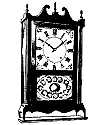 By this time Terry was making several models the old reliable
grandfather variety, wall clocks, and a new shelf-model. And to help
with the growing business he took in Seth
Thomas as a partner.
By this time Terry was making several models the old reliable
grandfather variety, wall clocks, and a new shelf-model. And to help
with the growing business he took in Seth
Thomas as a partner. Later Thomas decided to go into business for himself and make a shelf model after one of Terry's designs. This clock was a novelty in those days because the works were enclosed. Thomas paid Terry $1,000 for the right to make this new type. Today, 134 years later, the Seth Thomas organization is still making clocks. To some people the 200 years it has taken to develop and standardize a business may seem a long time. In the same period we have grown from a country of a few thousand settlers to the greatest engineering and manufacturing nation in the world. In fact our production skill was a major factor in saving the World from chaos. Yet there are people who seem to think that because we have so many evidences of human progress around us the picture is complete and the final chapter has been written. They can clearly see what we have done but apparently they cannot see the many unfinished jobs and thousands of unborn ideas that lie in the Future. |








